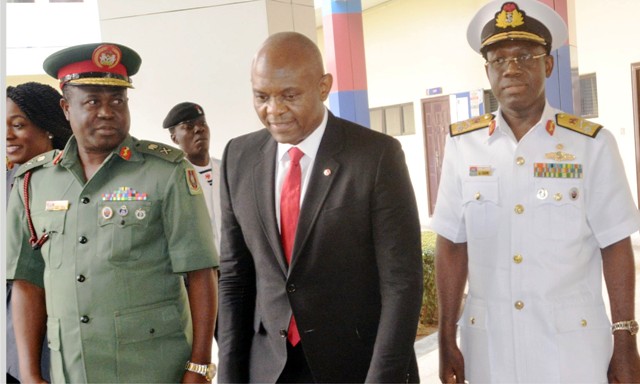Business
Ghana Approves 10% Pay Rise For Public Workers
Ghana’s wages commission said on Friday it had approved a 10 per cent pay rise for public sector workers and that the potentially inflationary measure would be back-dated to January this year.
Falling inflation and a stable currency have since late 2009 given the Bank of Ghana scope to make a total 350 basis points of cuts to bring the prime rate down to 15 per cent, with further easing seen dependent on prices staying under control.
George Smith-Graham, chief executive of the Commission, told Reuters the pay rise would apply across the board to Ghana’s 470,000 or so public sector workers and complemented a planned reform of the wages structure later this year.
“They will receive the actual salary reflecting the 10 per cent (rise) in July but the arrears will be paid in the months of August and September,” he said by telephone.
“This is a way of cushioning those public sector workers who may not receive any enhancement under the ‘single spine’ scheme,” he said, referring to the planned new structure.
The so-called Single Spine Salary Structure (SSSS) is due from July to put all public sector workers on the same pay scale. It is seen as potentially inflationary because many will see their salary bracket revised upwards.
Smith-Graham declined to say how much the pay rise would cost public finances.
Ghana’s government, which is gearing up for the first revenues from its Jubilee oil field later this year, has been praised for bringing inflation to just under 12 per cent.
The Bank of Ghana has brought the prime rate down to 15 per cent in recent months and has said it could envisage cutting interest rates further as long as inflation kept easing.
“This latest news … will raise inflation risks somewhat,” said Standard Chartered regional head of research Razia Khan, noting it could also prompt the government to claw back revenue by cutting utility price subsidies, itself an inflationary move.
Ghana was also due to announce new utility tariffs later on Friday, with increases widely expected, but the announcement was postponed until next week.
Kobla Nyaletey, head of liquidity management at Barclays Ghana Treasury, said he believed the measure was compatible with spending already envisaged by the 2010 budget.
“There are some challenges ahead though, from probable upward (utility) tariff price adjustments and the implementation of the single spine salary structure,” he said.
The pace of inflation fell to 11.66 per cent in April and is seen dipping into single digits in the next few months before an expected rebound in prices later in 2010.
Analysts forecast a further rate cut in June and possibly one more after that.
Bank of Ghana Governor Kwesi Amissah-Arthur told Reuters in a May 14 interview the bank would cut rates further if compatible with the outlook for inflation and growth, which is set to more than double from around six per cent this year.
Business
Insecurity, Poor Power Supply Hamper Business Activities – Survey

Business in Nigeria remain under pressure as a result of insecurity and erratic power supply which continue to stifle productivity in the country.
This is even as new data from the Central Bank of Nigeria (CBN) indicate sustained improvements in economic activity.
This was the response of businesses in the CBN’s October 2025 Business Expectations Survey (BES) and the Purchasing Managers’ Index (PMI) report.
While the PMI showed that economic activity expanded for the 11th consecutive month, the BES revealed that businesses are still grappling with crippling operational constraints that threaten to reverse recent macroeconomic gains.
According to the BES conducted between October 6 and 10, firms identified insecurity (71.8 points) as the most critical challenge affecting operations nationwide. This was closely followed by insufficient power supply (70.9 points), multiple taxation (70.2 points), high interest rates (68.4 points) and financial constraints (65.6 points). Analysts say these constraints underscore the depth of structural weaknesses confronting Nigeria’s private sector.
Despite these challenges, the survey reported a rise in business optimism. The Business Confidence Index increased to 38.5 points in October from 31.5 in September. Firms also projected confidence levels to reach 45.6 points in November, with expectations of further improvement over the next three to six months.
However, sector analysts warn that the optimism remains fragile due to the lack of significant improvements in the operating environment.
The BES further showed a modest rise in capacity utilisation from 60.4% in September to 62.0% in October, suggesting that businesses have yet to deploy their productive capacity amid ongoing disruptions fully.
In contrast to the structural constraints highlighted in the BES, the PMI report indicated strengthening economic momentum. The composite PMI rose to 55.4 points, reflecting expansion across major components such as output, new orders, employment, inventories, and supplier delivery times.
A sectoral breakdown showed that the agriculture sector recorded the most substantial improvement, with its PMI climbing to 57.5 points, marking 15 consecutive months of expansion. The services sector also expanded for the ninth straight month to 55.6 points, while the industry sector rose to 54.2 points, the highest in more than a year.
The CBN attributed the positive trends to improvements in the broader macroeconomic landscape, including declining inflation, which eased from 24.5% in January to 18.0% in September, and the year-to-date appreciation of the naira across both official and parallel markets.
The BES showed that the North-East posted the highest business confidence at 56.1 points, while the South-South recorded the lowest at 23.3 points, a trend linked to declining activity in oil-producing communities.
Business
FG Set To Launch Free National Financial Literacy Training For 100,000 Youths,
The Federal Government will on Tuesday, November 25, officially unveil a strategic programme for a free nationwide training of over 100,000 youth on financial literacy.
The Federal Ministry of Youth Development will launch the programme in collaboration with Investonaire Academy. Tagged, the “Financial Literacy, Investment, and Wealth Creation programme.”
The flagship initiative is designed to equip young Nigerians with essential financial skills, investment knowledge, and digital competencies for sustainable wealth creation.
A statement signed by the Director, Press and Public Relations, Federal Ministry of Youth Development, Omolara Esan, and made available to newsmen, confirmed that the launch of the programme, to be held in Abuja, would promote nationwide participation.
It added that the launch would bring together senior government officials, development partners, private sector leaders, and youth representatives to explore innovative approaches for improving financial capability and strengthening the economic prospects of young Nigerians.
Minister of Youth Development, Comrade Ayodele Olawande, would serve as the chief host, while the Minister of Women Affairs, Hajiya Imaan Sulaiman-Ibrahim, would grace the event as the Special Guest of Honour.
Also expected are representatives of key government institutions and private sector partners, including Dr Enefola Odiba, International Programme Director, Investonaire Academy, and Mr. Bashir Nurmohamed, Chief Executive Officer, Hantec Markets
The statement reads, “A major highlight of the event will be the unveiling of a free national financial literacy training programme targeting over 100,000 youths annually. The programme will be powered by a state-of-the-art Learning Management System (LMS) designed to enhance financial intelligence, investment capacity, and entrepreneurial readiness among Nigerian youth.
Lady Godknows Ogbulu
Business
‘Entrepreneurs, Not Foreign Aid Drive Nigeria’s Growth’

The chairman of the United Bank for Africa, Tony Elumelu, says Nigeria’s economic transformation will be driven by entrepreneurs, not government handouts or foreign assistance.
Elumelu, who spoke at the Grow Nigeria Conference 2.0 and themed ‘Empowering Nigeria’s Entrepreneurs: Building Institutions That Last’, in Lagos, Monday, said the nation’s future is already being shaped by business owners who refuse to settle for mediocrity.
Elumelu, who is also the founder of the Tony Elumelu Foundation, described Nigeria as an entrepreneurial nation but stressed the need to build institutions that can stand the test of time.
“Starting businesses is good. Sustaining them is critical, and that’s how we transform this economy,” he said.
He noted that many promising ideas fail because the systems and support structures necessary for growth are absent.
According to him, Nigeria’s renewal must come from the private sector, backed by strong governance frameworks and proper succession planning.
“Nigeria will not be built by government handouts or foreign aid. Government’s role is critical, but Nigeria will be built by entrepreneurs — by you, building businesses that create jobs, hope, and prosperity from the ground up,” he said.
Elumelu, however, emphasized that entrepreneurs cannot succeed in isolation.
“You need frameworks — clear governance, succession planning, and relentless focus on value. We need the right environment. We need a Nigeria where policies are predictable, infrastructure works, and financing is truly accessible,” he said.
He called for stronger alignment between public and private sector efforts, warning that progress would remain limited if institutions work independently rather than collaboratively.
Elumelu commended the Director-General of the Small and Medium Enterprises Development Agency of Nigeria (SMEDAN), Charles Odii, for ongoing reforms within the agency.
He further lauded President Bola Tinubu for appointing young Nigerians to lead key institutions and for prioritizing youth entrepreneurship.
“Let us cut the bureaucracy. Make finance and opportunity real, not theoretical. Let’s help Nigeria’s entrepreneurs move from surviving to winning.
“Every job we create fights insecurity. Every thriving business increases our tax base and accelerates prosperity for all,” Elumelu added.
-

 Business1 day ago
Business1 day agoKeyamo Lists Aviation Investment Opportunities For Investors
-
Rivers23 hours ago
New Year Festival: Dokubo Urges Citizens’ Reorientation In Cultural Values
-
Politics1 day ago
UK, Switzerland Urge Increased Women’s Rep In Governance
-
Sports1 day ago
Corruption, Impunity Bane Of Nigerian Football – Dalung
-
Sports1 day ago
Insurance Beat Pillars In A Dramatic Way
-
Ict/Telecom1 day ago
Expert Tasks Nigerians On AI
-

 Business1 day ago
Business1 day agoVDM, Mr Jollof’ll Face The Law – NCAA
-
Rivers23 hours ago
Navy Targets Training Reforms To Boost Maritime Operations

